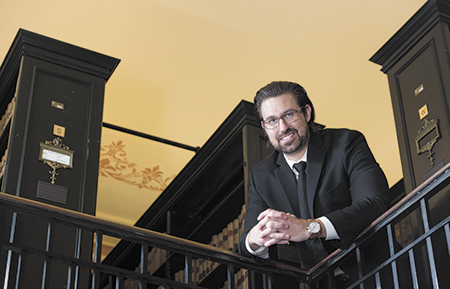Subscriber Benefit
As a subscriber you can listen to articles at work, in the car, or while you work out. Subscribe NowBlake J. Schulz has built a successful real estate practice, representing buyers and sellers in transactions totaling more than $1 billion. But he’s also helped many other young lawyers along the way. Outside the office, he’s active in man bar organizations as well as community groups that assist children and adults in need.
 What attracted you to real estate law?
What attracted you to real estate law?
My grandfather and father owned a small real estate development company. Their real estate business connected them to our community and their clients became our neighbors, friends, and family. Because of these connections, real estate has always been appealing to me. As a real estate attorney, I have been able to combine my interest in real estate with my lifelong goal of becoming an attorney.
When did you first decide you would become a lawyer, and what motivated you?
I honestly do not remember ever making the decision. It is something I wanted to do for as long as I can remember.
Who is someone who inspired or mentored you, and what did you learn from them?
Joseph Scimia. Joe is a true mentor, ally, friend and confidant. I practiced several years before meeting Joe, but most of what I have learned about being a commercial real estate attorney is a direct result of Joe’s mentorship. His mentorship has played an invaluable role in my growth and success in this field.
What’s been the most rewarding aspect of your practice?
The friendships I have formed with my clients and knowing that I work alongside people and companies that are responsible for the growth, expansion, rejuvenation and betterment our community.
What do you most enjoy doing when you’re not in the office?
I enjoy spending the little free time that I have with my wife.
Where do you see yourself in 20 years?
I could list a number of professional and personal goals I hope to have achieved by then; however, if there is anything I have learned during the past 20 years, it is that time flies and the only constant is change. For now, I plan to focus on the present and embrace the unpredictability of the future.
What does it mean to you to be a leader in nurturing new lawyers at the firm?
It means being committed to carving paths to success for younger attorneys. Most people who have achieved success had someone supporting and looking out for them. Because of the support that I received as a young attorney, I have an obligation to pay it forward. Whether it is through strategically inviting individual attorneys to networking events, seeking work for younger attorneys, or helping them navigate through the complexities of the legal practice, we should always seek out opportunities to help younger attorneys learn, grow and advance. It is also crucial that we maintain a culture of collegiality, respect, and inclusiveness at the firm.
What’s something about you not many people know?
As a transactional attorney, I try to stay as far away from the courtroom as possible; however, in 2010, I argued a complex real estate title matter before the Nebraska Supreme Court.
What has been your most memorable case?
In 2017, I served as primary counsel representing a real estate developer in the largest single asset acquisition of a multi-family apartment project in the history of the State of Indiana.
How do you see the legal profession changing in the next decade?
The legal profession is experiencing an era of turbulence and transformation, but it is hard to predict what the profession will look like in 10 years because there are so many forces at work. Especially for law firms, uncertainty is the hallmark of the future. What I do know is that it is bound to look very different. We now live in a highly mobile, globally interconnected, transparent and alert society that demands the same of us. In this changing landscape, resilience, adaptability and innovative thinking will be the keys to success.
What was your most memorable job before becoming an attorney?
I started working at the age of 8 and held many jobs before becoming an attorney (far too many to count). However, I would say that my most memorable job was my first — delivering newspapers as a paperboy in Seward, Nebraska.
If you hadn’t pursued a legal career, what would you be doing instead?
I would likely have pursued a career in real estate development.•
Please enable JavaScript to view this content.
